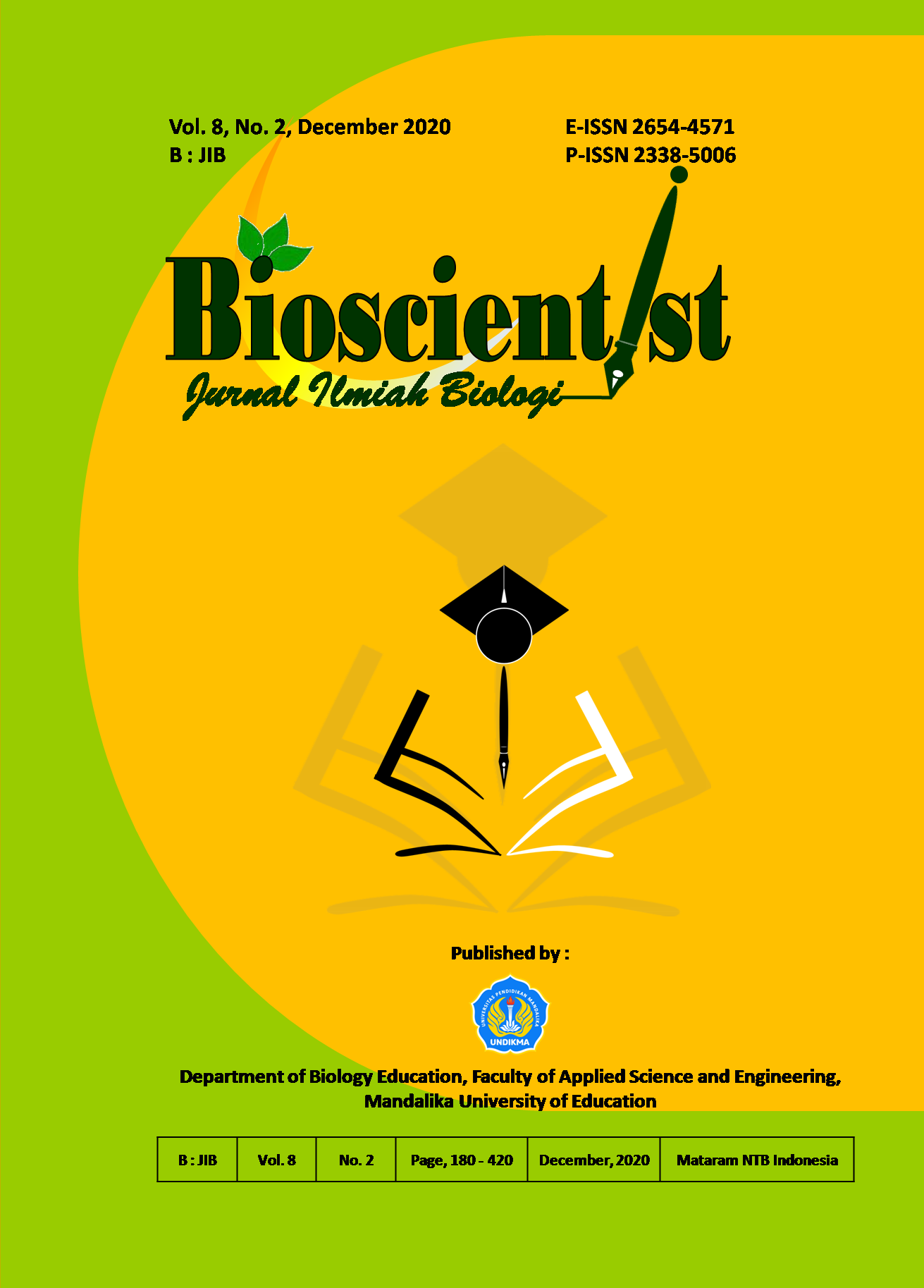Pengembangan Perangkat Pembelajaran Berorientasi Model Pembelajaran Kooperatif Tipe Jigsaw: Tinjauan Proses dan Hasil Belajar
DOI:
https://doi.org/10.33394/bioscientist.v8i2.3233Keywords:
Learning Tools, Jigsaw Cooperative, Process, Learning Outcomes.Abstract
This study aims to develop a jigsaw cooperative learning-oriented learning tool, then see its impact on the process and student learning outcomes of biology. The development adopts the Morrison, Ross, & Kemp (2010) model, which consists of nine stages and ends with field trials to produce teaching materials, teacher guides, lesson plans, LKPD, and test questions. Trial I was carried out on grade X MA Darun Najah Duman, to produce draft 1 learning tools and validate research instruments. Trial II on students of MA Putri NW Narmada. Measured aspects of the learning process include: observing the ability of teachers to apply learning tools, teacher and student activities, student cooperative skills, and capturing student responses with questionnaires. Learning outcomes are shown from the final test score. Testing using a one-group pretest-posttest design. Data from observations and questionnaires were analyzed using descriptive statistics and test score data were analyzed using the t one-sample test statistic using SPSS 16.0 for Windows. The results showed that the tools developed were able to be applied by teachers, increased teacher and student activities, encouraged students to do positive activities in learning, and accustomed students to cooperative skills. Students are happy with learning, so that learning that applies a jigsaw cooperative learning model-oriented device has a significant effect on the achievement of the minimum completeness criteria of students (μ = 78, μ0 = 67, t = 6,800, p = .000 <.005) The learning tools developed are suitable for use in biology learning at madrasah aliyah in Islamic boarding schools.References
Alim, Z. (2016). Pergeseran Orientasi Kelembagaan Pesantren di Madura dalam Perspektif Kiai Bangkalan. Jurnal Pendidikan Agama Islam (Journal of Islamic Education Studies), 4(2), 249-270.
Asiri, A. M. (2018). Scientific Inquiry-Based Teaching Practices as Perceived by Science Teachers. American Journal of Educational Research, 6(4), 297-307.
Astuti, W. P., Nur, M., Sri, Y., & Rahayu. (2011). Pengembangan Perangkat Pembelajaran untuk Meningkatkan Hasil Belajar Siswa melalui Pelatihan Strategi Belajar Membaca pada Pokok Bahasan Sistem Peredaran Darah di SMA. Pendidikan Sains Pascasarjana Universitas Negeri Surabaya, 1(1), 28-35.
Bassachs, M., Cañabate, D., Serra, T., & Colomer, J. (2020). Interdisciplinary Cooperative Educational Approaches to Foster Knowledge and Competences for Sustainable Development. Sustainability, 12(20), 1-17.
BSNP. (2010). Paradigma Pendidikan Nasional Abad XXI (Versi 1.0). Jakarta: Departemen Pendidikan Nasional.
Cholil, M. (2017). Relevansi Sistem Pendidikan Pesantren Tradisional dalam Era Modernisasi. Tarbawi : Jurnal Studi Pendidikan Islami, 3(1), 1-9.
Dendup, T., & Onthanee, A. (2020). Effectiveness of Cooperative Learning on English Communicative Ability of 4th Grade Students in Bhutan. International Journal of Instruction, 13(1), 255-266.
Dunlosky, J., Rawson, K. A., Marsh, E. J., Nathan, M. J., & Willingham, D. T. (2013). Improving Students’ Learning with Effective Learning Techniques: Promising Directions from Cognitive and Educational Psychology. Psychological Science in the Public Interest, 14(1), 4-58.
Karpicke, J. D. (2012). Retrieval-Based Learning: Active Retrieval Promotes Meaningful Learning. Current Directions in Psychological Science, 21(3), 157-163.
Morrison, G. R., Ross, S., & Kemp, J. (2010). Designing Effective Instruction (Sixth Edition). New Jersey: Wiley.
Noviana, K. Y., & Murtiyasa, B. (2020). Kemampuan Literasi Matematika Berorientasi PISA Konten Quantity pada Siswa SMP. JNPM (Jurnal Nasional Pendidikan Matematika), 4(2), 195-211.
OECD. (2012). Equity and Quality in Education: Supporting Disadvantaged Students and Schools. Paris: Organisation for Economic Co-operation and Development.
Oktaviani, H., Rachmah, U. F., Rahma, N. Q., & Sayidin. (2020). The Model of Virtual Learning Approach at MI Ma’arif NU Limbangan. Edukasia : Jurnal Penelitian Pendidikan Islam, 15(1), 99-118.
Prasetyono, R. N., & Hariyono, R. C. S. (2019). Pengaruh Flipbook Gerbang Logika dengan Menggunakan Livewire terhadap Kemampuan Berpikir Logis Mahasiswa Teknik Informatika. Journal of Informatics Education, 2(2), 50-62.
Sadikin, A., & Hamidah, A. (2020). Pembelajaran Daring di Tengah Wabah Covid-19. BIODIK, 6(2), 109-119.
Schunk, D. H. (2012). Learning Theories: An Educational Perspective (Sixth Edition). North Carolina: Pearson.
Suud, F. M., Chaer, M. T., & Setiawan, W. (2020). Implementation Educational Psychology Theories at Traditional Boarding School in Aceh. Journal of Critical Reviews, 7(9), 371-377.
Tran, V. D. (2013). Theoretical Perspectives Underlying the Application of Cooperative Learning in Classrooms. International Journal of Higher Education, 2(4), 101-115.
Vong, S. A., & Kaewurai, W. (2017). Instructional Model Development to Enhance Critical Thinking and Critical Thinking Teaching Ability of Trainee Students at Regional Teaching Training Center in Takeo Province, Cambodia. Kasetsart Journal of Social Sciences, 38(1), 88-95.













